Freedom of Expression and Academic Freedom
Five essays, with an introduction by Dr. Lori White, president of DePauw University
My best classes as an undergraduate involved sitting around a seminar table debating ideas. Those seminar discussions were robust, challenging, enlightening and hard. And they were only possible because of the collective diversity of students in the seminar who brought different perspectives – shaped by their individual backgrounds, experiences, ideologies and often intersecting identities. Moreover, I appreciated my professors for creating classroom environments that valued this freedom of expression, and who in turn modeled the passionate yet respectful conversations they had with their departmental colleagues whose scholarship and ideas were equally diverse (and sometimes in conflict with one another). At DePauw, this is the type of educational experience we want to provide for our students. We embrace these principles of free expression and academic freedom (i.e., the ability for faculty and students to pursue inquiry unfettered by restrictions) as essential catalysts for intellectual growth, critical thinking and the advancement of knowledge.
In our increasingly complex society, commitments to free expression and to diversity and inclusion are not opposing forces; they are mutually reinforcing pillars of a robust academic environment. These commitments are also necessary for a thriving democracy, one that welcomes and includes the many voices that are part of our incredible nation. At DePauw we are cultivating an intellectual ecosystem where viewpoint diversity flourishes, critical questions of our day are vigorously debated and students learn to engage in constructive disagreement under the guidance of invested campus partners, such as our Janet Prindle Institute for Ethics. These skills prepare students for success at DePauw and for meaningful participation in civic life as graduates. By championing the values of free expression, diversity and inclusivity, we are preparing our students to be thoughtful, engaged, ethical leaders of their generation who strengthen and renew our dynamic democracy.
The following essays contributed by our community members offer a breadth of perspectives and exemplify DePauw’s commitment to enriching intellectual dialogue. Each piece explores the necessity and challenge of fostering an environment where differing viewpoints can coexist and be debated respectfully. By sharing these insights, we aim to expand our comprehension and model the open, respectful dialogue essential for a liberal arts education that prepares students for meaningful participation in a diverse and democratic society.
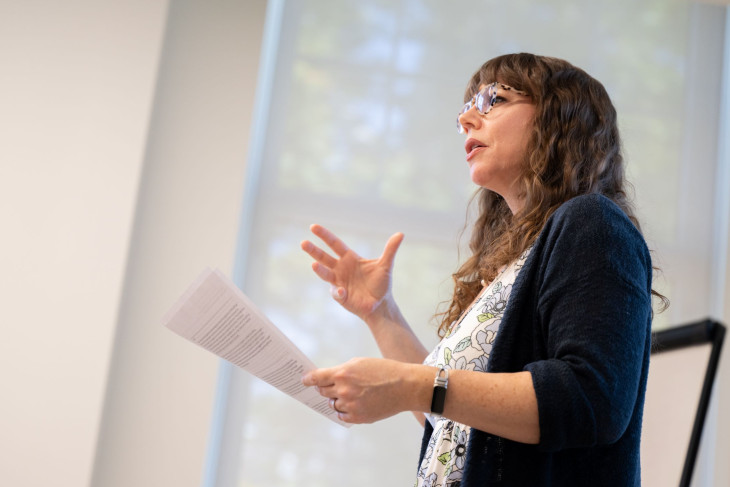
The hedgehog and the fox
By Amity Reading, Raymond Pence Professor of English, associate professor of English
In 1953, Russian-born British philosopher Isaiah Berlin published a short piece titled “The Hedgehog and the Fox: An Essay on Tolstoy’s View of History.” Berlin’s premise is taken from an aphorism originally attributed to the seventh-century B.C.E. Greek poet Archilochus (“πόλλ’ οἶδ’ ἀλώπηξ, ἀλλ’ ἐχῖνος ἓν μέγα”), and later recorded by Dutch humanist Erasmus in his Adagia (c. 1500: “Multa novit vulpes, verum echinus unum magnum”): “a fox knows many things, but a hedgehog knows one big thing.”
Berlin uses the aphorism to situate Leo Tolstoy among other great authors of Weltliteratur (Plato, Dante, Shakespeare, Hegel, Molière, Proust, Joyce), but the underlying dichotomy is relevant far beyond the study of literature.
Hedgehogs, Berlin proposes, “relate everything to a single central vision, one system, less or more coherent or articulate,” while foxes “pursue many ends, often unrelated and even contradictory … moving on many levels, seizing upon the essence of a vast variety of experiences and objects.” Berlin freely admits the limits of the framework – “like all over-simple classifications of this type, the dichotomy becomes, if pressed, artificial, scholastic and ultimately absurd” – and yet he spends the remainder of the article demonstrating its valuable explanatory power. The point is not to prove that hedgehogs are wrong and foxes right, or vice versa, or even to definitively sort all great writers into one camp or the other. The point is rather to explore the various ways that great intellectuals across history have organized their thinking.
Since I first encountered Berlin’s essay years ago, I have endeavored to pass some of its wisdom on to my students. I teach courses that address topics in world literature, global medieval studies, and intellectual history, and I frequently introduce students to cultures and time periods that are fundamentally different from their own. The content of these courses is not immediately “relatable” to students, to use a term that is popular in today’s discourse. But that is precisely the point.
This is, in theory, the very raison d’etre of the university: to produce, refine, and disseminate knowledge. This includes knowledge in its most traditional sense (facts, data, information, etc.), but it also includes ways of knowing – what philosophers call epistemology and humanists might call ideology, culture, or discourse. My duty as a professor is to effectively guide students on their own journey of knowing.
For example, I teach a first-year seminar called “Skepticism and Belief” in which I ask students to suspend their judgment about individual beliefs and instead consider the very concept of belief itself. I encourage them: Don’t only ask, “is this true?” Ask instead, “what truth is here? How is this way of knowing valuable on its own terms?”
Likewise, in my recent course on global studies in the Red Sea region, I directly asked students to tackle the issue of campus protests staged around one of the most contentious political events of their lives to date – the conflict in Israel and Gaza. I split the class into two groups and I asked them to directly tackle the issue of free expression on campus from the perspectives of students, faculty and staff. Both groups were given the task of developing a campus public protest policy for an imaginary college or university – one group from the perspective of the most restrictive policy possible (no public gatherings, signs or permanent structures), the other group from the most permissive (all protests, signs and posters, and permanent structures allowed). Each group was asked to think about when and why they might be forced to modify their policies. Having them consider how they would react to campus protests from each of these subject positions, I asked them: What ethical values motivate your decision? How do you reconcile your position with the value of academic freedom espoused by colleges and universities the world over? How do you balance the need for safety (of persons and property) against the need for free expression? The results were astounding, as students demonstrated that they not only can but also want to engage in complex situations with nuanced appreciation. Both groups, as it so happened, arrived at roughly the same conclusion: free expression is of the utmost importance, but some clear policies must be in place to reasonably mitigate harm to people and property.
Given today’s bifurcated political and social climate, it is more important than ever to encourage students to truly dwell with views that differ from their own and to reflect critically on their personal positions. I recently attended an institute on academic freedom and freedom of expression held at the University of Chicago, and much of our conversation revolved around this very issue: how we reaffirm our shared intellectual values and strengthen our commitment to encouraging a plurality of viewpoints in our classrooms and on our campuses. To do this, we must all learn to understand and value both hedgehogs and foxes, and to become mindful of our own patterns of thinking in the process.
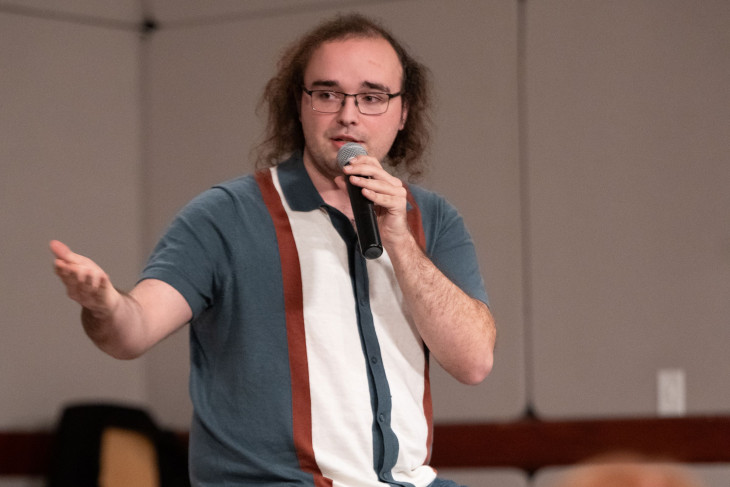
Lessons in being a good citizen and a good person
By Bodhi Hays ’25
I’ve always admired people who can hold their beliefs with passion.” While I wouldn’t call myself apathetic, I used to find it hard to hold fast to something in an argument. People make good points, a bit of self-doubt gets mixed in, and it’s easy to find yourself being swayed. Of course, we’ve all got things we do believe in strongly, but finding balance between stubbornness and an open mind is difficult. It’s that juggling act that makes free speech a meaningful value though, especially in an environment meant for learning like DePauw’s campus. For me, that balance came in my philosophy classes.
Everyone knows the stereotype of philosophy majors being argumentative to a fault. I’d say it’s how we show we care, but it’s just as often the case that someone’s got a chip on their shoulder. You can imagine this falling apart very quickly with upset students and annoyed professors all around, but philosophy as a discipline is geared toward it. Learning rules of logic and how to read sources in good faith obviously helps and is a necessary step for any conversation across different values, but the classroom setting is the most important. Spending a semester in a small group lets you learn how people think and get past the imaginary opponent you’re usually arguing with in your head. While this doesn’t mean everyone agrees, it does lead to a sense of respect in knowing that someone else’s values are coming from the same kind of thinking that brought you to your own.
That is probably the most impactful lesson I’ve taken away from my time at DePauw, that differences aren’t always the result of someone being wrong. While that isn’t always the case for questions of ethics and other values, many disagreements are built on equally good premises. Being able to acknowledge when the “other side” has a good point not only helps you understand your own beliefs, but fosters a way of seeing each other as a part of a social, political or academic community. When we stand by our beliefs and can defend them, we’re doing a service to ourselves and others by testing what we believe and seeing which answers ultimately stand out.
While DePauw and its students aren’t always perfect – sometimes it’s just too easy to shut something down for being too far out there – I think it has served me very well as an environment in which to learn how to defend what I believe while also keeping myself open to alternatives. The importance of free speech and properly engaging with others is a value I hope to carry into my professional life and one that I hope DePauw will continue to safeguard for students to come.
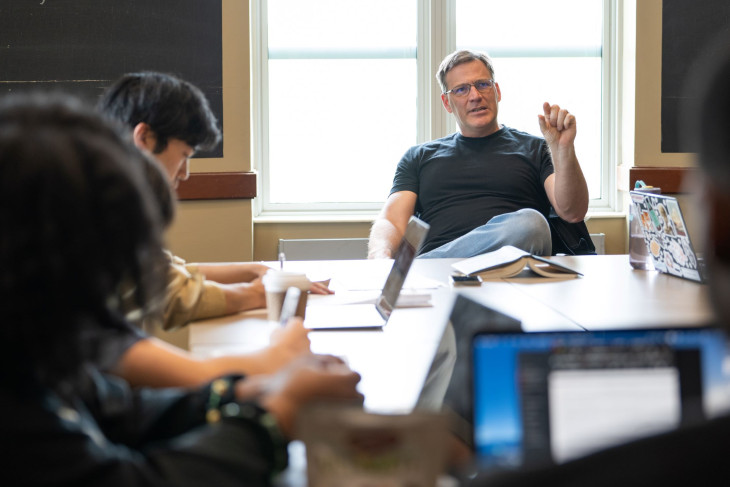
It’s the ideas that matter
By Erik Wielenberg, Blair Anderson and Martha Caroline Rieth Chair in Applied Ethics and professor of philosophy
You enter a room of strangers and say: “So, what do y’all think about abortion?” Lots of things might ensue; thoughtful discussion about abortion is unlikely to be one of them. Frank discussion of polarizing topics is crucial for intellectual growth and developing the leaders the world needs, but such discussion doesn’t just happen. Teaching a class at DePauw is like getting to know a person: each class has its own unique personality. And, just like with a person, hard conversations with a class require a foundation of trust. It takes a shared understanding that the classroom is a place for trying out ideas, making mistakes, perhaps inadvertently causing offense – and that you won’t be punished for holding the “wrong” views. DePauw’s small classes and public commitment to free expression help make such goals achievable.
I try to show my students that my aim is not to convert them to my views but rather to help them articulate their own views and to think – really think – about views that conflict with their own. Sometimes I can sense from their hesitant silence that a number of students disagree with what’s been said but are reluctant to say so. I may try to anticipate the source of their disagreement – “some of you may not buy that because…” – and that often loosens the tongues of the skeptics. If an important perspective lacks a student spokesperson, I’ll fill that role. The students come to understand that whether the view I speak for is my own is irrelevant – it’s the ideas that matter. And in order to determine which ideas make the most sense, it’s important to be able to consider all kinds of arguments without worrying about offending the professor or disagreeing with the predominant views of the day. Psychologists Jonathan Haidt and Fredrik Bjorklund write: “If you are able to honestly examine the moral arguments in favour of slavery and genocide (along with the much stronger arguments against them), then you are likely to be either a psychopath or a philosopher.” For them, that’s a descriptive claim; for me, it’s a mission statement – and part of the mission is to show my students how to think like a philosopher.
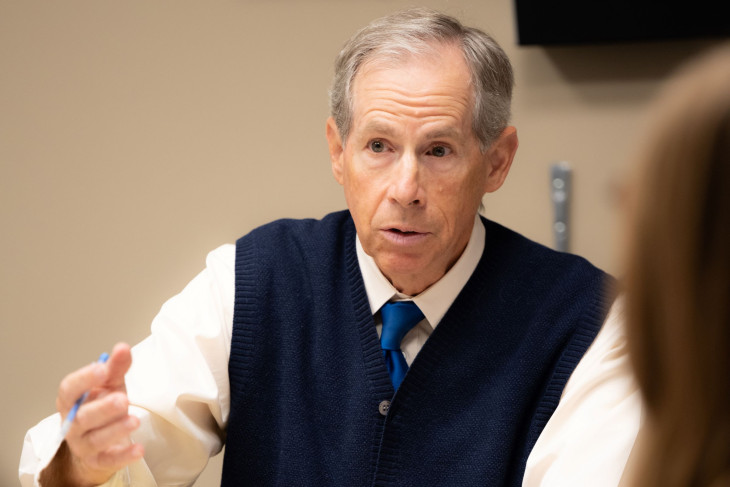
DePauw has work to do to ensure free expression on campus
By Jeffrey M. McCall, professor of communication
The Russian constitution provides for freedom of speech and of the press. The same is true for China and North Korea. Practically speaking, of course, it matters little what is written on paper in those countries. Their citizens are clearly not free to express themselves in speaking or writing. There are repercussions for the brave souls in those countries who are willing to speak up. Those punishments send a chilling message to anybody else who might think about expressing unapproved messages.
Albert Einstein understood the challenges associated with free speech when he wrote, “Laws alone cannot secure freedom of expression; in order that every man may present his views without penalty, there must be a spirit of tolerance in the entire population.”
Princeton University professor Keith Whittington has written extensively about the importance of free expression in academia. He wrote in the Fordham Law Review, “Ultimately, realizing free speech principles on college campuses is a matter of culture as much as it is a matter of policy.”
Pretty much every college these days has fancy policies saluting freedom of expression and free inquiry. Those policies, however, have been generally insufficient in creating and managing an environment that allows open, reasoned discourse and scholarship. Wide majorities (more than 80 percent) of students around the country, including DePauw students, report they self-censor in the classroom, in living units and on social media. The fear of being “canceled” for expressing one’s views certainly disrupts the atmosphere for learning and limits the rhetorical sphere.
Surveys show that nearly two-thirds of college students approve of shouting down speakers and about half are OK with blocking fellow students from attending a campus speech. Of course, many colleges avoid such possible tensions by just not inviting any speaker who might challenge prevailing campus orthodoxies.
It is difficult for colleges to create a robust environment for free expression when hiring practices require litmus tests on sociocultural topics and administrations engage in activist opining on various hot-button issues of the day. The effect is a campus climate curtailed by groupthink, a terrible condition for any institution that wants to promote wide-ranging debate. Noted political observer Walter Lippmann warned of this problem a century ago when he wrote, “Where all think alike, no one thinks very much.”
Any campus that truly wants a healthy free speech environment must test itself. That’s what some DePauw students attempted last semester when they distributed flyers protesting recent curricular changes on campus. They were summarily hauled through a campus disciplinary process.
DePauw has work to do to provide an environment in which free expression and deliberation happens. That work needs to be done in hiring, in the curriculum and in campus presentations. Cultural critic G.K. Chesterton once observed that civilization hinges on being able to settle things by debate. But the debate must be robust, otherwise, he warned, “Freedom of speech means practically that we must only talk about unimportant things.” Higher education has to be a place where the important things can truly be debated from multiple perspectives, with the hope that reason will prevail.
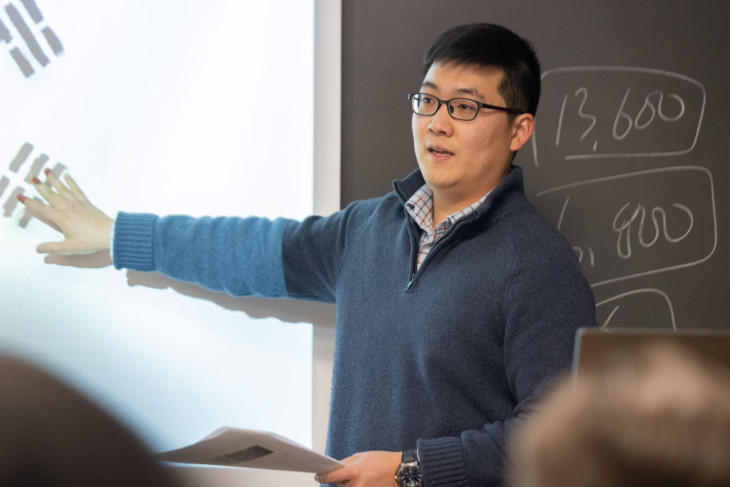
Leaping Forward: DePauw’s journey to free expression
By Town Oh, assistant professor of economics and management
In 2021, DePauw University ranked dead last on the Foundation for Individual Rights and Expression’s campus freedom of speech index, marking it as the worst campus for free exchange of ideas and inquiry. This issue is not unique to DePauw; other liberal arts colleges are in the same boat. This was a shock to me and I wanted to investigate why. Thanks to generous support from the Asher fellowship, I undertook a project to identify the institutional characteristics that correlate most with a poor speech climate. My analysis revealed that the two biggest predictors are: 1) being a private elite institution and 2) having a large presence of arts and humanities majors – both defining features of liberal arts colleges.
Although this paints a bleak picture for the future of liberal arts colleges, there are reasons to be hopeful. Liberal arts colleges like DePauw offer unique opportunities to address complex societal issues. I believe that behind the lower reported levels of freedom of speech is the noble effort to nudge students to engage in conversations on difficult and sensitive topics. Our curriculum, class size and majors are designed to do just that.
It is not necessarily that large public schools with big STEM programs are more tolerant of different ideas, but rather these schools often do not offer a venue to discuss difficult ideas. If you take the weights out of the gym, no one will ever leave the gym feeling like they struggled. The struggle that students face in expressing their opinions may be a positive sign that they are being challenged. Liberal arts colleges ought to capitalize on this strength and normalize the struggles students face while engaging in intensive dialogue, even when it may be offensive toward certain groups. If our aim is to help students navigate and make sense of a world that is full of offensive ideas and people, college should be the place where they learn how to handle these.
This is not to say that the school should just take a laissez-faire approach. There is a role that faculties and administrators can play in establishing minimal ground rules and providing a safe and fertile ground for free expression. I believe DePauw has made much progress on this end.
Fast forward to 2023, DePauw has made an unprecedented leap to 41 out of 248 on the aforementioned speech index, nearly being the highest among all liberal arts colleges. This is perhaps the result of concerted efforts to mend the speech code that was previously quite restrictive. The true measure of success will be evidenced by how our students actually engage in class discussions. I applaud the efforts that DePauw has taken so far (this magazine edition being one of them) and want to encourage faculties and students to continue to prioritize diversity of thoughts and expressions in the classroom.
DePauw Magazine
Fall 2024
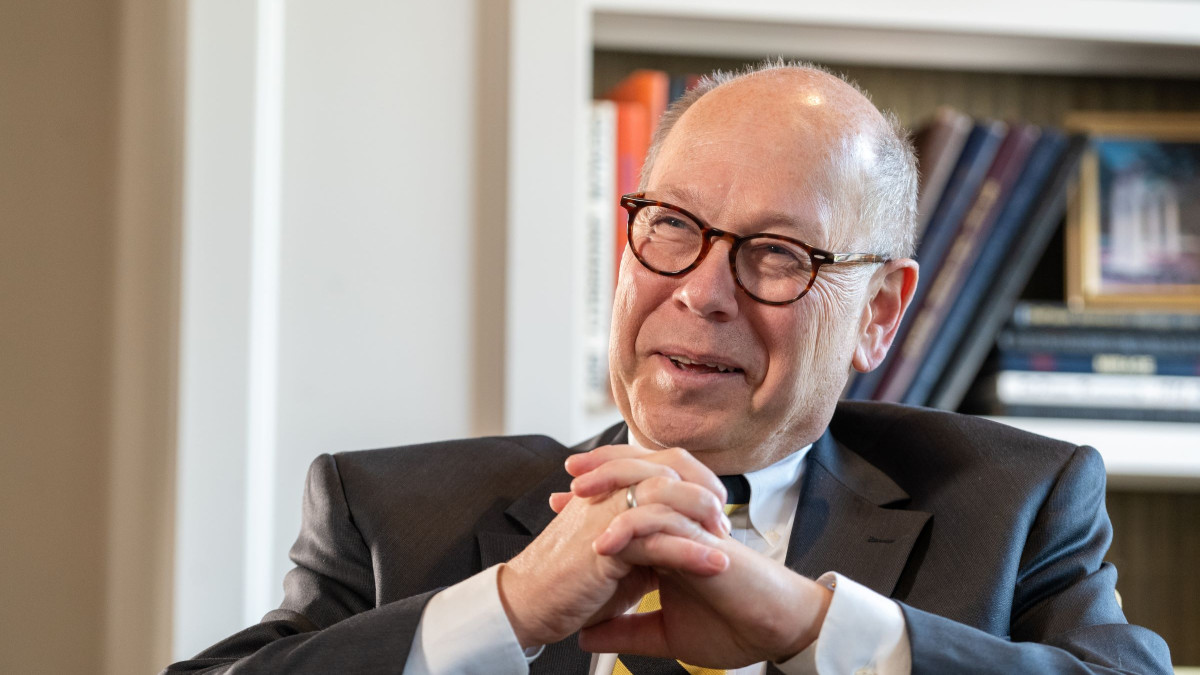 Andy Rieth ’80
Andy Rieth ’80 Freedom of Expression and Academic Freedom
Freedom of Expression and Academic Freedom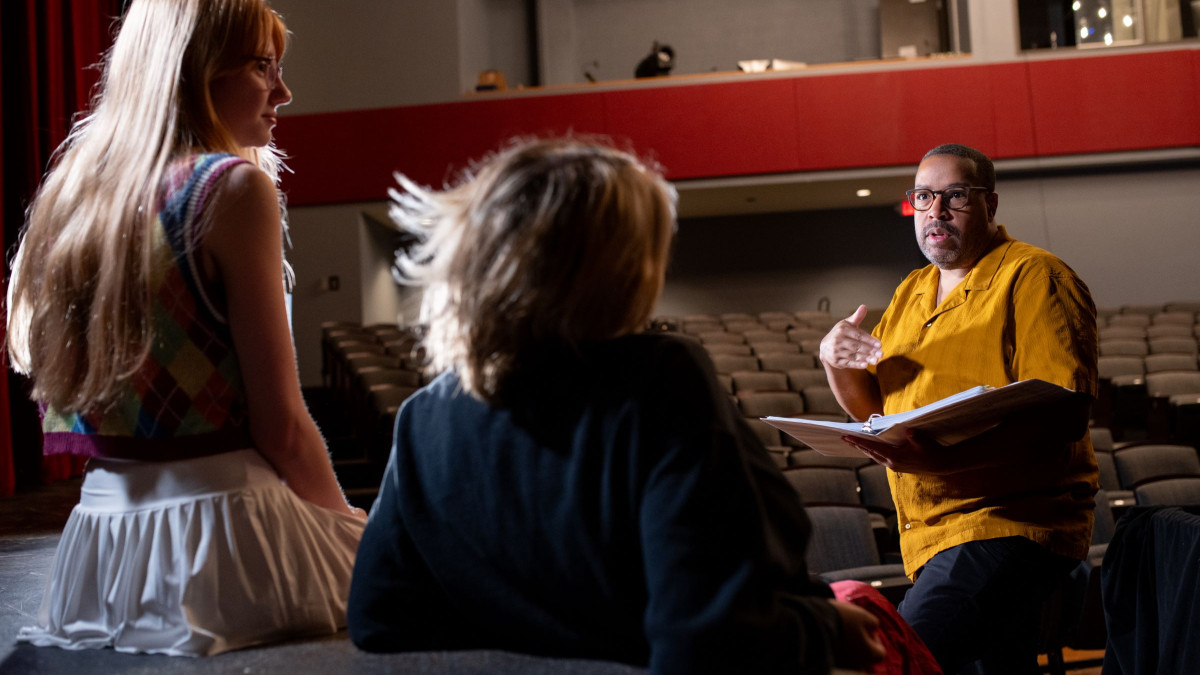 The Launch of the Creative School
The Launch of the Creative School Full Speed Ahead
Full Speed Ahead
DePauw Stories
A GATHERING PLACE FOR STORYTELLING ABOUT DEPAUW UNIVERSITY
Browse other stories
-
Athletics
-
Women's Golf - Williams Selected Academic All-America®
-
Football - 336 Students Named to 2025 Spring Tiger Pride Honor Roll
-
Football - DePauw-Record 190 Student-Athletes Named to NCAC's Dr. Gordon Collins Scholar-Athlete Honor Roll
More Athletics
-
-
News
-
Outstanding scholars named to Spring 2025 Dean's List
-
Alumni News Roundup - June 6, 2025
-
Transition and Transformation: Inside the First-Year Experience
More News
-
-
People & Profiles
-
11 alums make list of influential Hoosiers
-
DePauw welcomes Dr. Manal Shalaby as Fulbright Scholar-in-Residence
-
DePauw Names New Vice President for Communications and Strategy and Chief of Staff
More People & Profiles
-
-
Have a story idea?
Whether we are writing about the intellectual challenge of our classrooms, a campus life that builds leadership, incredible faculty achievements or the seemingly endless stories of alumni success, we think DePauw has some fun stories to tell.
-
Communications & Marketing
101 E. Seminary St.
Greencastle, IN, 46135-0037
communicate@depauw.eduNews and Media
-
News media: For help with a story, contact:
Bob Weaver, Senior Director of Communications.
bobweaver@depauw.edu.